
Performance Max Campaigns: What We’ve Learned So Far About Google’s New Campaign Type
We all like shiny, new things, right?
That new phone.
That new car.
That new [insert whatever brings you the most joy here].
In fact, our brains are hardwired to appreciate and actually seek out novelty. We get a rush of happy chemicals (dopamine) when we experience something new. In short, “novelty makes us happy.” As digital marketers, we are always on the lookout for new things related to our trade — from new apps to new social platforms to new ad types.
So when Google Ads announced its new Performance Max campaign type, I was interested. What was this shiny, new campaign type — and would it get results for our clients?
What are Performance Max Campaigns?
Performance Max campaigns replaced Smart Shopping and Local campaigns in Google Ads in 2022 and Vehicle Listing Ads in fall of 2023. Google lists a bunch of benefits, but essentially, this goal-oriented campaign type is meant to simplify your campaign management. (And maybe simplify it too much, in my opinion, but more on that later.)
With Performance Max, you define a goal, and then you provide all of the assets and information about your product or service, including audience targeting signals, images and videos. Google then auto-generates ads that can serve across all of its available placements.
That means your ads run on all of Google’s inventory — Search, Maps, Display, Shopping, YouTube, Gmail, and Discovery networks — all within one campaign.
This type of campaign is enticing. It’s generally easier to set up — especially for novice Google Ads users — and you get access to all of Google’s ad placements without needing to manage a dozen campaigns. And it’s a smart campaign, so you do less work and put your goals (and your $$$) into Google’s machine-learning hands to get conversions and sales.
But is a Performance Max campaign worth it for your business?
We’ve researched and tested this campaign type with a few clients. Here’s what we liked and didn’t like about Performance Max.
What We Like About Performance Max Campaigns
A huge number of impressions.
The campaigns we’ve run have anywhere from four times to 20 times the number of impressions compared to Search campaigns (due to PMax campaigns showing ads across all the channels Google has to offer).
CPC is generally low.
Our campaigns averaged a $0.43 cost per click (CPC), with an average cost per conversion (CPV) of $5.56.
Considering the average CPC is $4.22 across Google Ads Search campaigns and average CPV is $53.52, we’re happy with these numbers.
Targeting is fairly simple and easy to implement.
Google uses URL expansion to direct traffic to different parts of your website, regardless of what final URL you specify. This is turned on by default when you create a Performance Max campaign.
If you want to avoid the campaign sending traffic to certain parts of your site — say, your careers section — you can easily add exclusion rules for pages that you don’t want targeted.
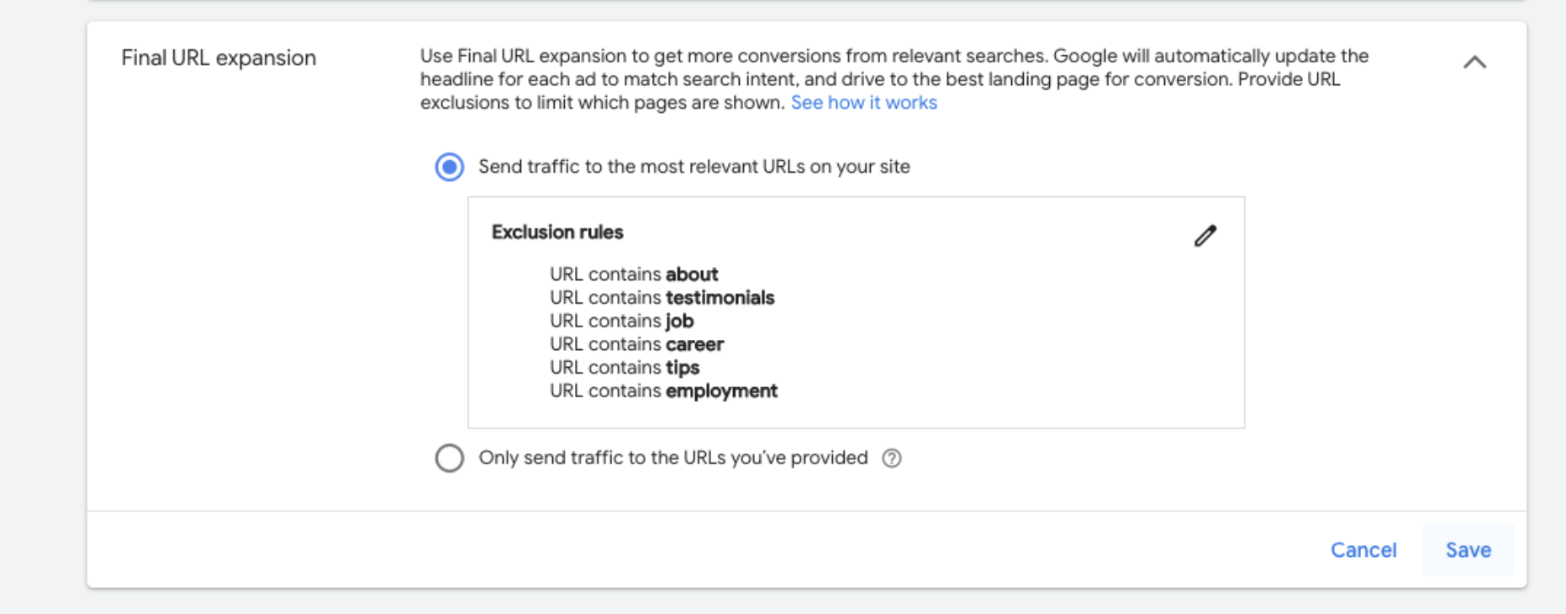
For example, if you are advertising new cars, you can exclude the vehicle service section of your website easily. If you want to target the product part of your website and exclude any about or employment sections, that’s also easily done.
If you want to have more control, you can select “only send traffic to the URLs you’ve provided.” This might be more useful in certain cases, such as if you own a car dealership and you only want a campaign to target your service pages.
What We Don’t Like About Performance Max Campaigns
Negative keywords aren’t easily added.
With Performance Max campaigns right now, you can’t add any negative keywords, or keywords you don’t want targeted. In order to add any negative keywords, you have to either submit a Google help request or add the keywords to the negative keywords at the account level (which you might not want to do).
In our experience, having the right negative keywords is nearly as important as having the right targeted keywords in any Google campaign. You have to help Google learn what searches you want to show up for — and which ones you don’t.
For one of our clients, their website is very well optimized for search. They don’t need to bid on branded keywords — such as their business name — to show up at the top of search results.
The Performance Max campaign insights showed over the first month that it was generating calls and leads for our client — but it was mostly bidding on searches for the business name, which would probably have generated calls and leads without costing the client money from that click.
You have limited insights.
At 9 Clouds, we rely on data to prove what we’re doing is helping our clients achieve results.
While we can see clicks and conversions, in general, Google doesn’t show how it’s getting results for you.
That worries us a little, because we want to know the how and why. How did the results do better this month than the last? Why did it do worse the next month?
There are workarounds that can give you more insight in Google Analytics, but in general, you have limited insight into your ads in order to fully understand and optimize it.
In my opinion, Google is saying, “Creating a good campaign on our platform is so difficult. Just trust us and we’ll deliver better results for you.” Take that as you will.
Without the data, it’s difficult to truly say how or why the campaign is getting the results it is getting — or not getting — or to gain any insights to inform other campaigns or marketing efforts.
Performance Max Results Comparison
For one of our clients, we’re running a Performance Max campaign alongside a standard Search campaign. (As we note in the next section, this type of campaign is meant to complement a Search campaign, not replace it.)
This client is a local vehicle rental business in a mid-size city with plenty of competition from national and regional chains. Our budget was $200 a month for the Performance Max campaign (or roughly $6.50 a day) and $275 a month for the Search campaign (or just less than $9 per day).
Here are the results:
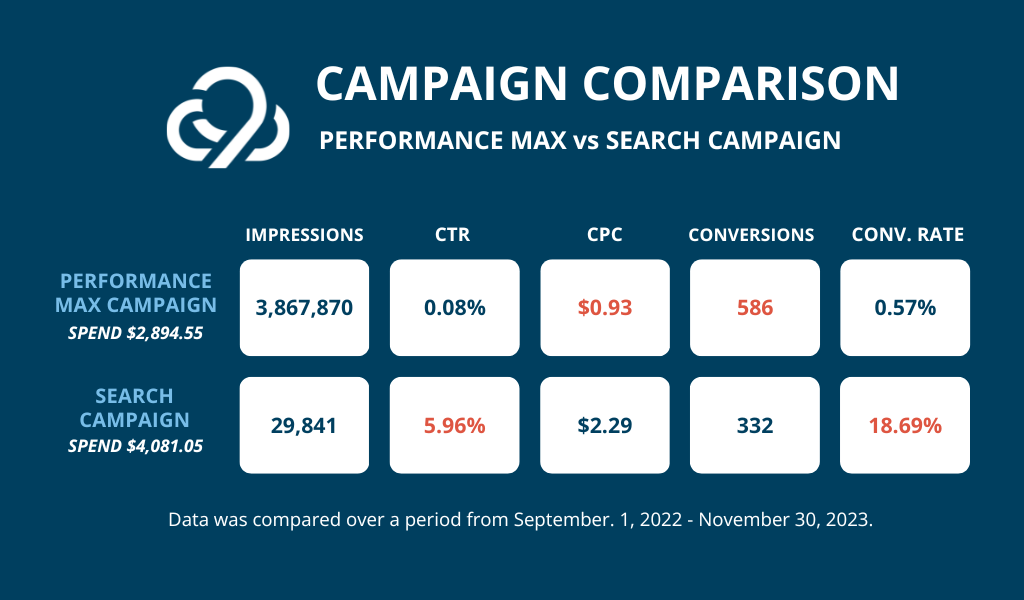
The impressions were staggeringly different — with the Performance Max campaign earning more than 100x the number the search campaign did — and the PMax campaign saw a substantially lower cost per click (CPC) at 93¢ (compared to $2.29). That being said, the click-through rate (CTR) and conversion rates for the PMax campaign (0.08 percent and 0.57 percent, respectively) are much lower than Search campaign (5.96 percent and 18.69 percent).
This isn’t completely surprising, given the other channels the ads are running on (such as Display) generally produce lower CTR and conversion rates than Search campaigns. For this specific client, though, the actual number of conversions (a.k.a. people reserving a vehicle online) was significantly higher (586) than the Search campaign (332).
Other Things We’ve Learned About Performance Max
Performance Max campaigns should be used alongside other campaigns.
This type of campaign is meant to complement a Search campaign, not replace it. So you are meant to run a Performance Max campaign at the same time as a standard, keyword-based Search campaign.
There was a lot of discussion when this campaign type was released about Performance Max campaigns cannibalizing other, high-performing campaigns. Google says that (in theory) your existing Search campaign will be prioritized over the Performance Max campaign.
As noted above, though, with the lack of insights for Performance Max campaigns, it’s difficult to tell if this is actually happening.
Look at your goals to decide what campaign to run.
The above being said, if you only have enough budget for one campaign, look at your goals.
The Performance Max campaign replaced the Google Local campaign type. If your goals are to promote driving directions and phone calls — like a restaurant — a Performance Max campaign may well drive some real success for you.
Use all the assets the campaign asks for.
When you set up a Performance Max campaign, it will ask you to provide certain assets as part of the “asset group” — in short, what Google will use to create your ads across all its channels.
You’re asked to provide:
- 5 headlines
- 5 long headlines
- 5 descriptions
- 20 landscape and/or square images
- 5 Logos: at least 1 square logo, others are optional
- 5 YouTube videos (not required, min. 10 seconds)
The more high-quality assets you provide, the more you give Google’s artificial intelligence (AI) to work with — which should deliver better results.
A note here: while the videos aren’t required, if you don’t upload a video, Google will create one for you — and an AI-created video can leave a lot to be desired.
Be prepared to be patient.
It takes time for AI to learn, which means it will take time for your campaign to deliver the results you want.
According to Wordstream, if you aren’t prepared to spend at least $50 per day for at least a month, it might not be worth even testing a Performance Max campaign. That’s because, according to the article, the campaign probably won’t generate enough data and learning for it to work properly.
That being said, we’ve yet to run a campaign that’s had that amount for a budget, and we’ve seen good results. However, we recommend running a campaign for at least three months in order to generate enough data to see whether it’s working or not.
Here’s one tweet that illustrates the need for patience well, even when you do have a higher budget:
Don’t be afraid of the data.
For some clients, a Performance Max campaign has worked well and delivered the conversions they’re looking for. With others, we tested the campaign, and then turned it off when the data said it wasn’t working.
We’re not afraid of trying new things. And with the push toward automation and AI running more and more things, we expect other campaign types to potentially be folded into Performance Max campaigns, as well.
That’s why it’s important to take the time to research and test. And if something doesn’t work, learn from it and try something else.
Performance Max Benchmarks
Our team has been running Performance Max campaigns since Google introduced them. We were hesitant in the beginning, but over time, we’ve tested them with many of our clients and seen success (especially since Google forced everyone running vehicle ads to switch to PMax).
These are the benchmarks we’ve found to be our north stars.
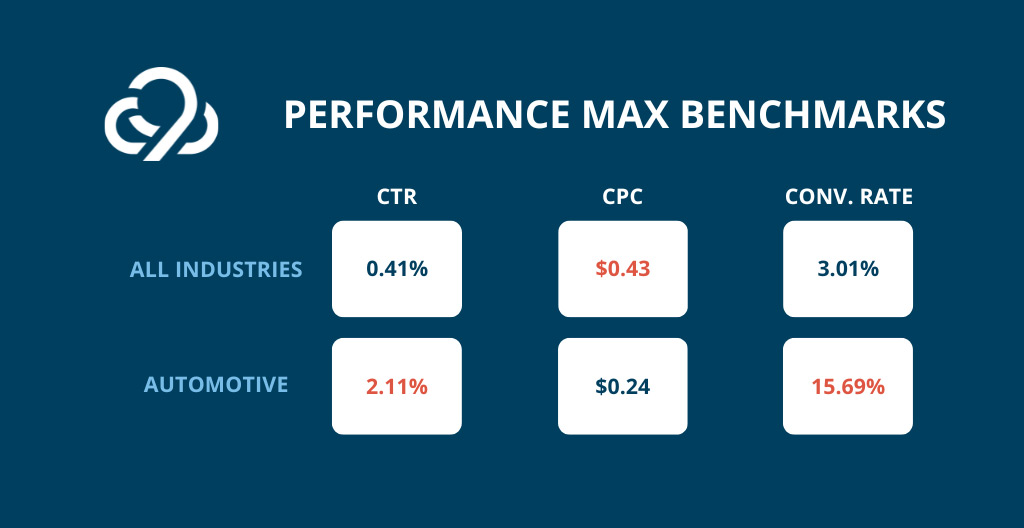
We’ve listed both specific automotive benchmarks here, along with all industries, as we had enough automotive clients running Performance Max campaigns with vehicle feeds incorporated in 2023 to establish initial benchmarks.
- All Industries — CTR: 0.41% | CPC: $0.43 | Conv. Rate: 3.01%
- Automotive — CTR: 2.11% | CPC: $0.24 | Conv. Rate: 15.69%
Automation + Human Expertise = Success
As with any automation, the best results come from humans and AI working together. No campaign is completely set-it-and-forget-it — especially if you don’t want to waste money.
The campaign you run depends on the goals for your business — and you don’t have unlimited funds to try everything. Our search engine marketing specialists have the knowledge and experience to help you determine what campaign types will deliver results for you.
Our clients rely on us to recommend, run and optimize search engine advertising campaigns.
Ready to get started? Request a digital marketing proposal to take your business to the next level.
Get Your Proposal »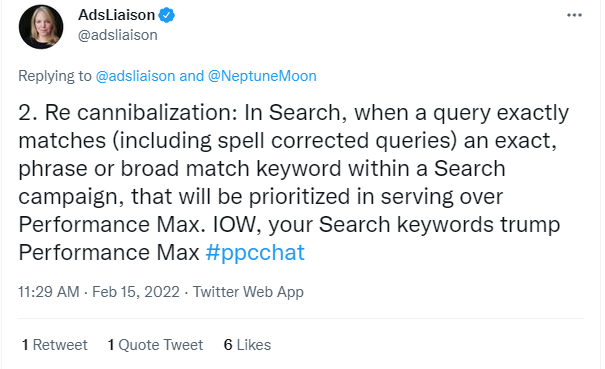
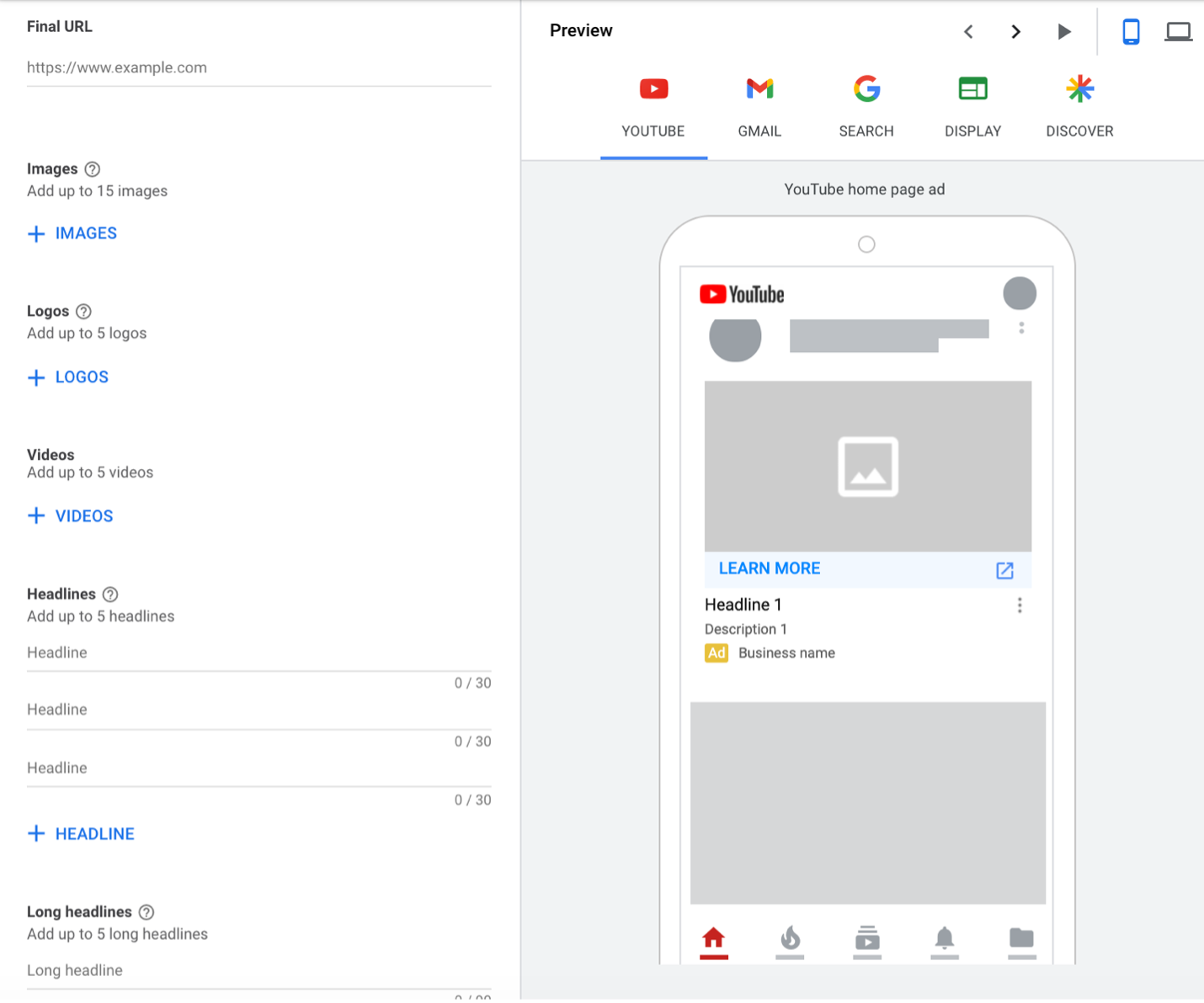
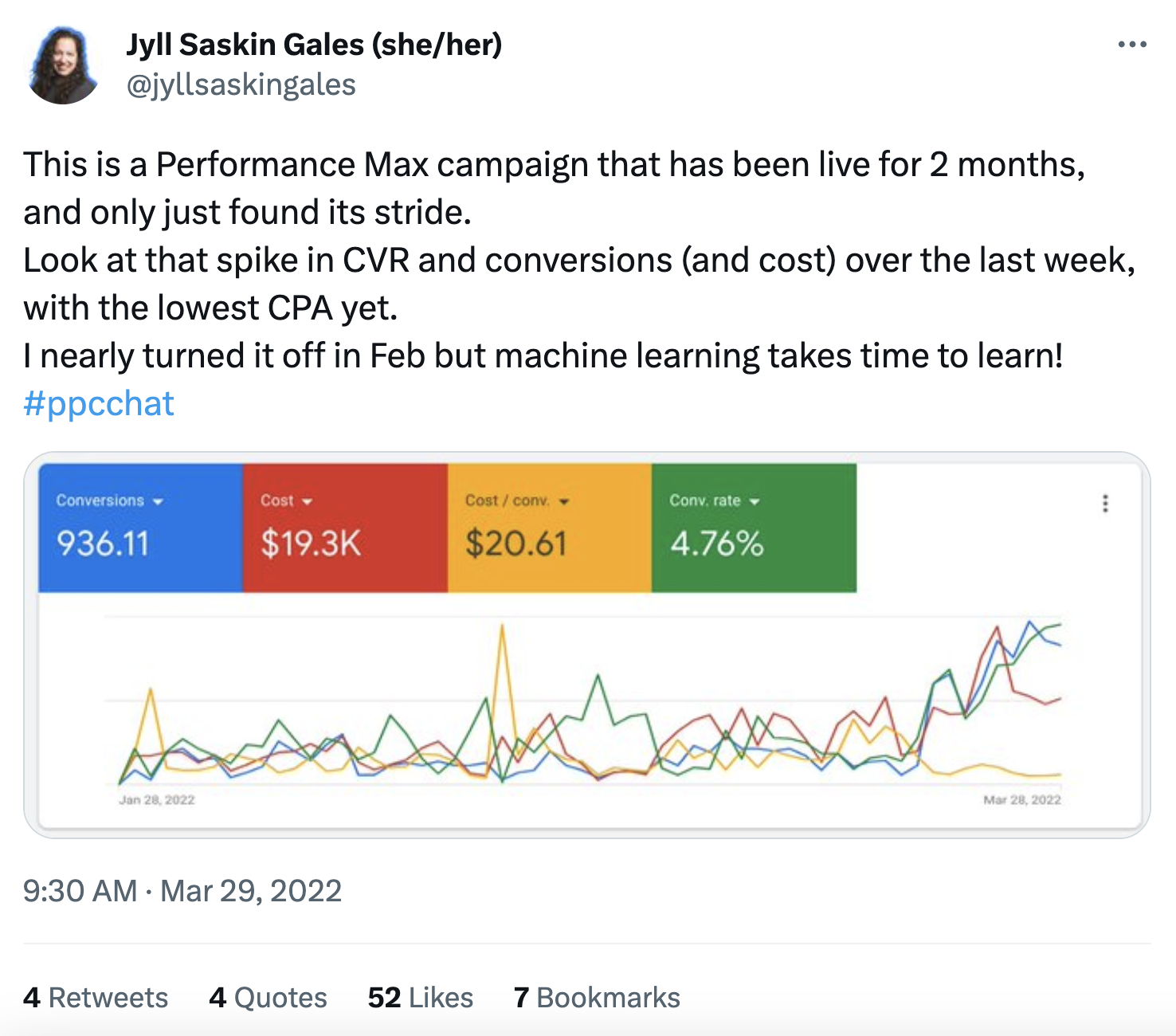



![Human vs AI A/B Test [Spoiler Alert: Humans Win!]](https://9clouds.com/wp-content/uploads/2024/02/Volvo-dealership-1-600x388.png)


